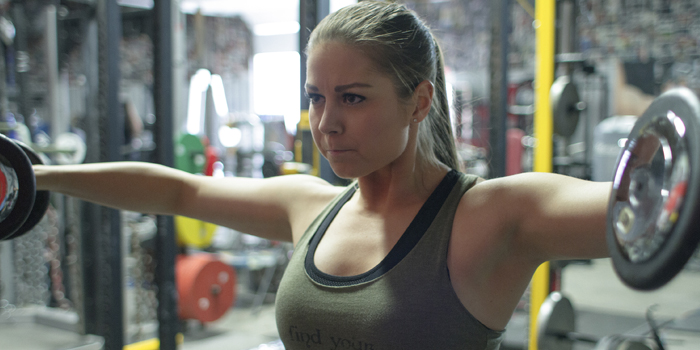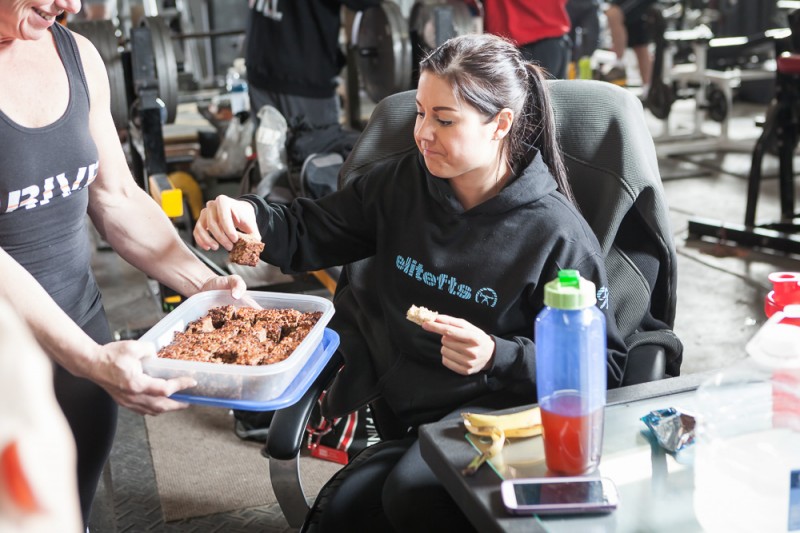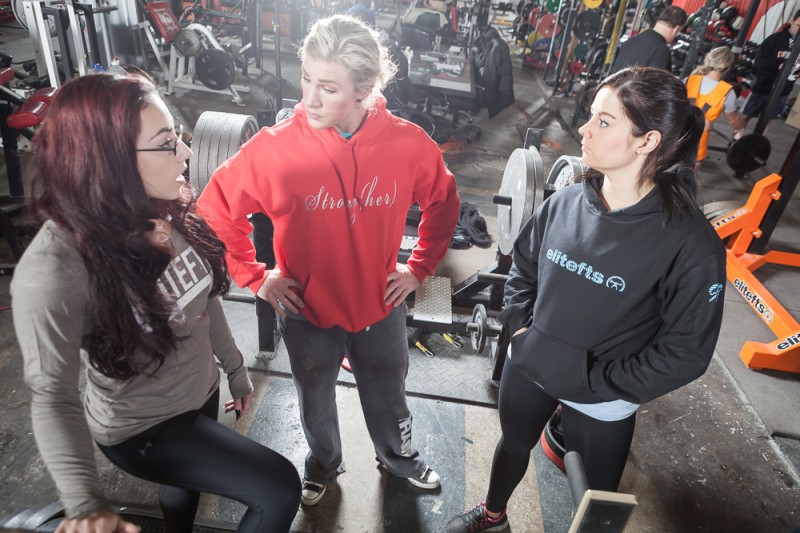
Don’t you hate it when you look back at an ideology or thought that you once believed to be true, realizing that it may have just been a load of shit? Yes, of course you do. No one likes to be wrong. It sucks. It makes us feel stupid. But in reality, isn’t this realization—the realization that our beliefs are always changing, evolving, and growing—a good thing? Personally, I think so. Maybe it is because the New Year is approaching and I am feeling nostalgic, or because I turned 30 this year so I now feel my advice is past the point of eye rolling from non-millennials. Nevertheless, below is a list of thoughts I once believed to be true that I no longer do, in training and in life.
A slow reverse diet out of a contest prep is necessary for metabolic and hormone health.
Okay, so I don’t necessarily believe this to be false, but I do now believe that it “depends.” The whole point of a reverse diet is to get someone out of a caloric deficit as soon as possible to restore hormone and metabolic function back to or close to normal levels. Everyone is going to respond differently post-show when adding calories back in and pulling back on training. There’s no reason to drag out a reverse diet if the person is responding well, not blowing up, feeling good, etc. However, some folks need a slower reverse out of a show. At the end of the day, the “slowness” out of contest prep dieting shouldn’t necessarily be intentional. The rate at which you add calories back into your plan should be 100% dependent on the specific individual and their response. There really is no example protocol to follow for a reverse diet. Regardless, a reverse diet should be progressive in nature, but the rate of progress is completely individual. You need to get back to healthy ranges within all aspects, and you get there as fast as your body will allow it.

Eating below 1,200 calories a day to get stage lean is unhealthy and will destroy your metabolism.
I will start this one by saying that I do not necessarily believe eating only 1,200 calories is a brilliant idea, but I do think the “damage” it does has been over exaggerated by many. I honestly don’t know why I believed this so strongly in the first place. It could have been because 1,200 calories itself was just thrown around a lot in general within multiple contexts. Some called it the point of “starvation mode.” Which, again, isn’t entirely accurate. If 1,200 calories was a true “starvation mode” for everyone, that would mean we are all the same gender, weight, height, have the same metabolic history, etc. Oh, and yeah, we would all die pretty quickly if that actually were true.
The truth about the “healthfulness” of dieting down for a show is not so much how low you get in calories, but how long you stay there. The impact dieting has on your metabolic and hormone health has more to do with how long you are in a caloric deficit than how low you actually go. For example, back when I did my first show I hired a coach to do my prep. That coach didn’t provide the macros for me; I was just given a food list and meals, so naturally, I calculated it myself. For about 16 weeks I was eating between 1,100 and 1,300 calories the entire time. Did I get lean? Sure did. But I also developed skin issues, my hair was falling out, I never felt full after prep, and I had a laundry list of other issues.
RECENT: Throw Away the Calorie Calculator — A Better Way to Manage Caloric Intake
Now, fast forward to my last show, for which I prepped about 20 weeks. I started over 2,000 calories and about two weeks out I was at 900 calories. Did I get lean? Sure did. Did I experience post-show issues like I did before? No. Did I technically hit a lower calorie intake? Yes. But I was not at that low point for as long. I also had re-feeds weekly this go-around, so on average, I was probably consuming more the entire prep than I did my first prep. That is where I am going with this. The length of time you are in a deficit can play a larger role in your health than how deep of a deficit you are in.
You must train heavy to achieve muscle growth.
My first article ever written for elitefts was "3 Ways the Platform Prepared Me for the Stage." Much of that article content was centered on how training heavy and powerlifting helped me build more density and size for figure. And that was true. However, I will say it is not true for everyone, dependent on a number of things.
I also do not find that to be true for me now. Now I find that I respond better to higher volume training with variances in rep/set style when it comes to building actual muscle size. I am much weaker in the big lifts than I used to be years ago when I competed in powerlifting, but from a muscularity standpoint, I have more shape overall. Very rarely do I hit max effort work, but instead utilize various rep/set techniques such as tempo variations, rest pause, eccentric work, etc. All of these techniques are probably under 70% of my max for the exercises they're used for.

Now, do I still train to failure at times? Yes, but for reps. I can’t tell you the last time I did a heavy single. Or double. So I think initially in my competition years I really needed a stronger base and foundation. I was weak as well, so I definitely think powerlifting did me some favors. However, as your training age changes, you may need to adjust over time. Going lighter for volume works.
Being in a relationship is a distraction from your goals.
Uh-oh. Here comes the personal stuff. The stuff I never share with anyone because My Wall makes Trump’s Wall look like a picket fence. Let’s dive in, shall we?
For the past two and a half years I strongly believed pursuing a relationship or even just dating would be nothing more than a waste of my time and energy. Two and a half years ago I was coming out of a long-term relationship that exhausted me of everything and put a huge toll on my personal goals. When you spend years putting everything you have into someone else, and nothing into yourself, you eventually wake up one day asking, “What the fuck am I doing?”
And that’s exactly what happened. It was because of my past experiences that, in my mind, a relationship also meant loss of autonomy and there was no way in hell I was going back to that place. So I steered clear, kept my head down, and busted my ass on my own path. Some in this situation might find themselves lonely and searching, but I treated my single-ness like a pedestal. I was particularly stubborn, almost as a resentful attempt to rebuild the person I knew I was, instead of being the person who had been behind the scenes building someone else’s dreams and esteem, all while leaving her own dreams behind. I didn’t belong there.
WATCH: Table Talk with Dave Tate — Balancing Your Life
Needless to say, a very loud “fuck that" moment happened and, well, here we are today. But! I am ironically not alone. (Say whhaaattt? I know, I know. My DM’s are closed, gentlemen.) That being said, currently, I truly don’t think being in a relationship is a waste of energy if the energy of that relationship is positive. Having someone in your corner is positive energy. Having someone get you out of your own head is positive energy. Having someone to laugh with when you fuck up is positive energy.
So for those of you anti-relationship folks out there giving this a read, I personally suggest that when you meet people you ask yourself this question: “Is this person a replacement or an enhancement?” A relationship becomes a distraction when you use it as a way to replace or fill some empty space in your life. You are probably trying to fill a space a previous shit-hole left with yet another shit-hole. Don’t do that. Instead, focus on your autonomy, surround yourself with positive people, kick the chihuahuas to the curb, and become a full person independently. And at that point, you will allow people into your life only if they act as an enhancer. Not a leech, not a pity partier, not a user.
Balance is necessary for happiness.
I used to believe balance was working 40 hours a week, relaxing on weeknights after work, and then going out a bit on the weekends. That was “balance” to me. Everyone preaches that balance should focus on having time off to do what you love. But that’s where it doesn’t make any sense to me now. Why aren’t we programmed to do what we love the majority of the time in our careers or jobs? Why are we programmed to “need” an escape? Why does balance have to mean working less than 40 hours a week? Balance is bullshit because everyone’s balance is unique to them.
My “balance” back then did not make me happy. My balance now makes me extremely happy. However, I have four jobs (yes, four, including a full-time job and running my own business) so I work seven days a week, well over 40 hours a week, 90% of the time. So how does this make me happier than when I worked less than 40 hours a week and was relaxing a good portion of the time? Because that life was mediocre and boring as hell. So instead I chose to take on really cool jobs and opportunities that I enjoy and I am not broke as fuck anymore.
There, I said it. I actually LOVE to work. I love creating things, feeling productive, providing opportunities for others, and having options financially. There is nothing wrong with that! Everyone’s perspective on happiness is different, so instead of trying to fit yourself into the standard mold, do what YOU want to do.
It is crazy how much can change in a short amount of time. How thoughts and philosophies are created, thrown out, and new ones are formed. I truly hope I can continue to look back and disagree with what I once thought. That is a strong indicator that I am learning and getting better. That’s a win in my book.











